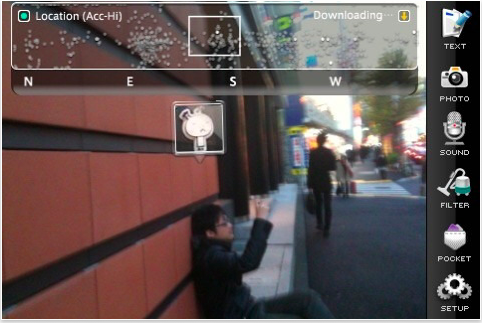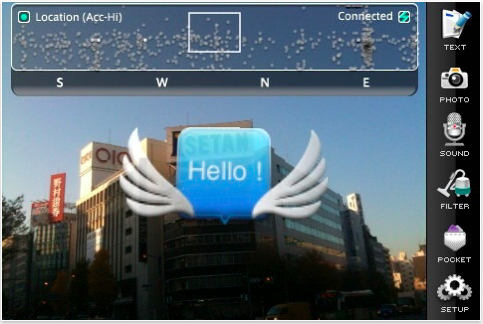 The wait is finally over. Over a year after its memorable (and zany) debut at TechCrunch 50 2008, Tonchidot’s Sekai Camera iPhone application is now available worldwide. The augmented reality (AR) app has already established itself as a huge hit in Japan, and now Tonchidot is taking its shot at world domination. Or, at least, at getting everyone to start leaving each other geo-tagged virtual Post-It notes. You can grab Sekai Camera here, free of charge.
The wait is finally over. Over a year after its memorable (and zany) debut at TechCrunch 50 2008, Tonchidot’s Sekai Camera iPhone application is now available worldwide. The augmented reality (AR) app has already established itself as a huge hit in Japan, and now Tonchidot is taking its shot at world domination. Or, at least, at getting everyone to start leaving each other geo-tagged virtual Post-It notes. You can grab Sekai Camera here, free of charge.
The premise behind the app is quite simple: as you go about your day, Sekai Camera invites you to leave text messages, photos, and audio recordings that will appear as floating bubbles wherever you created them. You can also fire up Sekai Camera to look at the world around you to see what kind of content has been left by other users. As you spin the camera around, you’ll see new messages pop up as floaty icons. Click one, and you’ll see the content that was shared previously. It’s a bit like Twitter in that everything is publicly available, but everything is built around location — if you aren’t near a message, you can’t see it.
The application itself is quite well done. As with a number of other AR apps, Sekai Camera takes advantage of the iPhone’s GPS and compass (if you have a 3GS), allowing you to shift the position of your iPhone viewfinder as new tags pop up in real-time. I found the performance to be good, though there aren’t many tags floating around in my area yet so I couldn’t test to see if performance is affected by a high density of tags. Because high traffic locations will likely spawn dozens of bubbles (or more), the app offers a number of filters. The interface is simple and polished, though it may take users a minute to figure out what some of the features (like the Pocket) are for.

Tonchidot has already established Sekai Camera as a huge hit in Japan. It launched there in late September, and was installed on over 10% of Japan’s iPhone userbase within four days (though the company acknowledges that the Japan has a relatively small iPhone install base). Tonchidot has already partnered with some major Japanese retailers, and the company says it was recently named “Best App in 2009” by Apple Japan.
The worldwide release actually features version 2.0 of Sekai Camera, which introduces a few features that improve on the original Japanese release. In the original version of the app, you had to be physically present to see tags, making it difficult (if not impossible) to keep tabs on items your friends had created. The new version also your to ‘follow’ friends (you’ll see a Twitter-like stream of their activity). You can also put your favorite tags into a ‘Pocket’, which essentially lets you bookmark tags for future reference so that you don’t have to track them down again.
The application itself free, but there are a few avenues that Tonchidot can use to monetize. For one, they can allow businesses to insert their own tags in the Sekai virtual world. Tonchidot can also provide these companies with PC-based tools to manage their tags remotely (something that normal users can’t do). Sekai Camera isn’t launching with any of these relationships in place in the US, but in Japan Tonchidot has partnerships with a number of major retail stores.
To help further enhance the app, Tonchidot is allowing third parties to integrate their content into the Sekai Camera virtual world via an API. For example, if I used a virtual whittling app to cut out a 3D version of the TechCrunch logo, I could post it right in front of TechCrunch headquarters, so anyone who used the Sekai Camera app nearby could see it. This API has quite a bit of potential, and Tonchidot says that a number of game developers are currently finding ways to fuse their games with the service. These third party integrations will likely prove very important to Tonchidot’s success. Checking in on random messages left by people nearby is fun at first, but it will need variety and some addictive features to keep people coming back for more.
Tonchidot has come a long way from its classic TechCrunch50 presentation, which left some of the judges scratching their heads as Tonchidot execs answered their questions with non-sequiturs and over-the-top gestures. Their success in Japan proves that they’re on to something — the question now is whether or not that will translate to success abroad.
Tonchidot recently announced a $4 million funding round.
